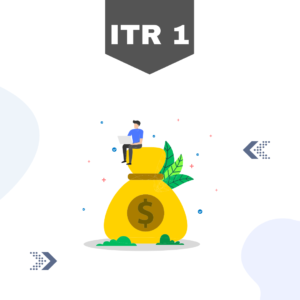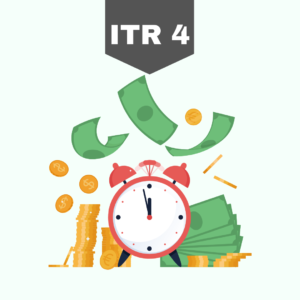
Starts
199
Only
This return is applicable for a Resident (other than Not
Ordinarily Resident) Individual having Total Income from any of the following
sources up to Rs 50 lakh
- Salary/pension
- One House property
- Other Sources (Interest, Family Pension, Dividend, etc.)
- Agricultural Income up to Rs 5,000

Starts
299
Only
This return is applicable for Individual and Hindu Undivided Family (HUF)
- Not having Income under the head Profits and Gains of Business or Profession
- Who is not eligible for filing ITR-1

Starts
1499
Only
This return is applicable for Individual and Hindu Undivided Family (HUF)
- Having Income under the head Profits and Gains of Business or Profession
- Who is not eligible for filing ITR-1, 2 or 4

Starts
799
Only
This return is applicable for an Individual/HUF/a Firm (other than LLP) which is a Resident having Total Income up to Rs 50 lakh and having income from Business or Profession which is computed on a presumptive basis (u/s 44AD / 44ADA / 44AE) and income from any of the following sources:
- Salary/pension
- One House property
- Other Sources (Interest, Family Pension, Dividend, etc.)
- Agricultural Income up to Rs 5,000

Starts
2499
Only
This form can be used by a person being a:
- Firm
- Limited Liability Partnership (LLP)
- Association of Persons (AOP)
- Body of Individuals (BOI)
- Artificial Juridical Person (AJP)
- Local Authority
- Representative Assessee
- Cooperative Society
- Society registered under Societies Registration Act, 1860 or under any other law of any State,
- Trust other than Trusts eligible to file Form ITR-7

Starts
9999
Only
Applicable for Companies other than those claiming exemption u/s 11.
Company includes:
- Indian Company
- Body corporate incorporated by or under the laws of a country outside India
- Any institution, association, or body, whether incorporated or not and whether Indian or Non-Indian which is declared by general or special order of the Board, to be Company, etc.

Starts
9999
Only
Applicable for Persons including Companies who are required to furnish returns u/s 139 (4A) or Section 139 (4B) or Section 139 (4C) or Section 139 (4D)
- Income derived from Property held under Trust wholly / in part for charitable or religious purposes
- Chief Executive Officer of every Political Party
- Various entities like Research Association, News Agency, etc.
- University, College or other Institution
2. PARTNERSHIP FIRM :- A partnership firm is a type of entity where more than one person is carrying out business under one entity. Partnerships firms in India are of two types - Registered partnership firms and unregistered partnership firms. Registering a Partnership is the right choice for small enterprises as the formation is straightforward and there are minimal regulatory compliance. The Partnership Act has been in existence in India since 1932, making partnerships one of the oldest types of business entities in India. A partnership firm can even be registered after it is formed. There are as such no penalties for non Registration of a Partnership firm. But unregistered Partnership firms are denied certain rights under section 69 of the Partnership Act that majorly deals with the effects of non Registration of Partnership firms.
3. COMPANY:- A private limited company that has been incorporated in India must ensure the compliances concerning the Companies Act, 2013 are adequately met. The companies Act, 2013 regulates the appointment, qualification remuneration, and retirement of the company’s Directors and other aspects such as conducting board meetings and shareholder meetings. The RoC compliance for registered Private Limited companies is necessary. Irrespective of the total turnover or the capital amount, the company must comply with the annual compliance requirement.
4. LLP COMPLIANCE:- LLP or the Limited Partnership is a hybrid combination of a limited and partnership company. Minimum two partners are required to incorporate an LLP there is no such upper limit. Limited Liability Partnerships are required to file the annual returns within 60 days from the end of the close of the financial year and account statement and solvency within 30 days from the end of six months of the closure of the financial year. The financial year for the LLPs starts from the 1st of April to the 31st of March. The annual return for the LLPs is due on May 30th while the statement of accounts and solvency is due on the 30th of October of each financial year.
5. FOREIGN SUBSIDIARY COMPANY:- A company where 50% or more of its equity shares are owned by a foreign company is a foreign subsidiary company. The foreign company in such case is called the holding company or the parent company. Compliances are based on the company that is incorporated. Hence, it is necessary to understand what compliances are supposed to be met according to the type of the company, the operations of the industry, annual turnover, number of employees, etc. Foreign subsidiary companies are mandatorily required to maintain compliance according to the Income Tax Act, Companies Act, Transfer pricing guidelines, and FEMA guidelines.
